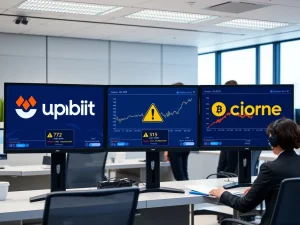Massive Potential: Deloitte Predicts $4 Trillion Tokenized Real Estate on Blockchain by 2035

Are you looking for the next big opportunity in the digital asset space? Deloitte, a leading global professional services firm, has released a compelling report that points towards a massive transformation in property ownership and investment. The prediction? Tokenized real estate could soar to an astonishing $4 trillion market value by 2035, fundamentally reshaping how we view and interact with property assets on the blockchain.
What Does Deloitte Predict for Tokenized Real Estate?
According to the new report from the Deloitte Center for Financial Services, the value of tokenized real estate is poised for explosive growth over the next decade. Here’s a snapshot of their forecast:
- Current Value (2024): Less than $300 billion
- Predicted Value (2035): Over $4 trillion
- Compound Annual Growth Rate (CAGR): More than 27%
This significant increase is attributed not just to the inherent benefits of blockchain technology but also to a structural shift occurring within the real estate sector itself.
How Blockchain is Driving This Transformation
Blockchain technology offers several advantages that make the tokenization of assets, including real estate, increasingly attractive. These benefits contribute directly to the predicted growth in tokenized real estate:
- Increased Liquidity: Tokenization breaks down large assets like buildings into smaller, tradable digital tokens, making them accessible to a wider pool of investors.
- Fractional Ownership: Investors can own a portion of a high-value property without needing to purchase the entire asset.
- Transparency: Blockchain provides a clear and immutable record of ownership and transactions.
- Reduced Costs and Friction: By potentially cutting out intermediaries like brokers and escrow services, tokenization can streamline transactions and lower associated fees.
- Faster Transactions: Settling property deals can take weeks or months; tokenization aims to reduce this time significantly.
The Rise of RWAs and Changing Property Use
The report highlights that real estate is already undergoing transformation. Post-pandemic trends, climate concerns, and digitization are altering property fundamentals. For example, office buildings are being repurposed into AI data centers, logistics hubs, or energy-efficient residential spaces.
Chris Yin, co-founder of Plume Network (a blockchain for RWAs), notes, “Investors want targeted access to these modern use cases, and tokenization enables programmable, customizable exposure to such evolving asset profiles.”
The broader RWA tokenization sector, which involves minting financial products and tangible assets on a blockchain, has also seen increased interest. Geopolitical factors, such as uncertainty from import tariffs, have even boosted capital flow into stablecoins and RWAs as potential safe-haven assets, according to Juan Pellicer, senior research analyst at IntoTheBlock. This was seen when tokenized gold volume surpassed $1 billion in trading volume recently.
What About Regulation and Liquidity?
While the potential is vast, challenges remain. Regulation is a frequently discussed hurdle for widespread blockchain adoption in traditional finance sectors like real estate.
Chris Yin suggests that increased adoption will naturally lead to regulatory clarity, drawing a parallel to Uber’s growth preceding widespread acceptance. “Regulation follows usage,” he stated, emphasizing that making tokenized products compliant with international regulations is crucial for broader market access.
However, not everyone is convinced that real estate is the immediate target for tokenization. Michael Sonnenshein, Securitize COO, expressed skepticism at a recent event, arguing that while blockchain can introduce efficiencies by removing middlemen, the onchain economy currently demands more liquid assets than traditional real estate offers. This points to a potential focus on other asset classes before tokenized real estate becomes fully mainstream.
Opportunities for Cryptocurrency Investment
The growth in tokenized real estate and the broader RWA sector presents new avenues for cryptocurrency investment. As more tangible assets are brought onto the blockchain, the demand for underlying protocols, infrastructure, and potentially even specific tokens associated with these platforms could increase. Investors interested in diversifying beyond traditional cryptocurrencies might find opportunities in platforms specializing in RWA tokenization.
Summary: The Future Looks Tokenized
Deloitte’s bold prediction of $4 trillion in tokenized real estate by 2035 underscores the immense potential seen in bringing illiquid assets onto the blockchain. Driven by the inherent benefits of tokenization and evolving property markets, the growth in the RWA sector is set to reshape investment landscapes. While regulatory clarity and liquidity concerns are valid points of discussion, the overall trend suggests a significant opportunity for innovation and potentially lucrative avenues for cryptocurrency investment in the coming years.









